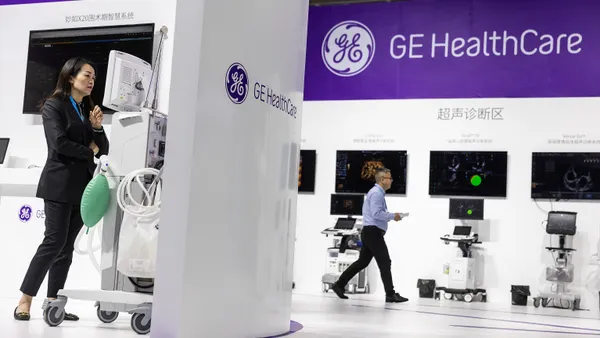Dive Brief:
-
LabCorp and Quest Diagnostics have put acquisitions of local and hospital laboratories at the heart of their growth plans and execs said they will press on despite challenges.
-
In presentations at the J.P. Morgan Healthcare Conference Tuesday, LabCorp and Quest again highlighted acquisitions and market share gains as key drivers of diagnostic growth, pointing to pricing pressures to explain why their smaller rivals will agree to sell up.
-
Similar dynamics were expected to play out last year but the rate of takeovers was slower than forecast, which LabCorp attributed to it being harder than expected to close deals.
Dive Insight:
LabCorp and Quest went into 2019 predicting some upsides to the Protecting Access to Medicare Act (PAMA), which is driving down how much Medicare pays for tests. The clinical laboratory leaders objected to the price cuts but felt they were better equipped to cope with them than smaller rivals, creating opportunities to consolidate the market.
However, the anticipated surge in acquisitions of local and hospital laboratories never materialized. Adam Schechter, who took over as CEO of LabCorp in November, discussed some reasons for lack of M&A activity during a presentation at the J.P. Morgan Healthcare Conference Tuesday.
"It’s surprising to me on how long it takes. It’s a lot of discussions, hospital by hospital and department by department. Trying to get people to move fast has been harder than I would have anticipated," Schechter said.
The lack of dealmaking hasn't dissuaded LabCorp and Quest from the hypothesis that PAMA price cuts will create opportunities to consolidate the industry.
After engaging in lots of discussions with potential targets, Schechter said his team is "starting to see people consider" selling to LabCorp rather than continuing as independent labs. The LabCorp chief executive also thinks hospital consolidation may accelerate the process, predicting that CFOs will play a more important role in decision-making and “when they see the numbers, [deals] might move faster.”
Such changes would create opportunities for LabCorp and industry counterpart Quest, which also remains on the hunt for acquisitions of smaller labs to integrate into its network.
"It’s still a very fragmented marketplace. There’s plenty of opportunity for us to consolidate it," Quest CEO Steve Rusckowski said at the J.P. Morgan event.
LabCorp and Quest need that to happen if their diagnostic businesses are to grow significantly. As it stands, Rusckowski put the overall growth of the market at below 2%. Both the leading clinical laboratory companies see acquisitions as a good way to grow above that rate and are tracking a pool of possible targets.
"We have a long list of potential opportunities for these type of acquisitions. They make a lot of sense. I would do as many of those as I could. We can be accretive in the first year. We can return our cost of capital within two years, typically," Schechter said.
LabCorp and Quest are also working to organically gain market share. The changes to some contracts, notably Quest’s newly gained access to lives covered by UnitedHealthcare, created the potential for shifts in market share at the start of 2019.
One year later, Quest is still pushing to extract full value from the opportunity, which Rusckowski sees as part of a set of changes worth up to $4 billion in additional revenue. For its part, LabCorp took a hit when it lost exclusivity with UnitedHealthcare but now thinks the situation has stabilized.
"The vast majority of the change that was saw from the opening of those contracts was last year. There may be a very small impact in the first quarter this year but nothing that I would consider meaningful," Schechter said.
Quest plans to announce fourth quarter earnings Jan. 30. LabCorp's earnings report is scheduled for Feb. 13.










